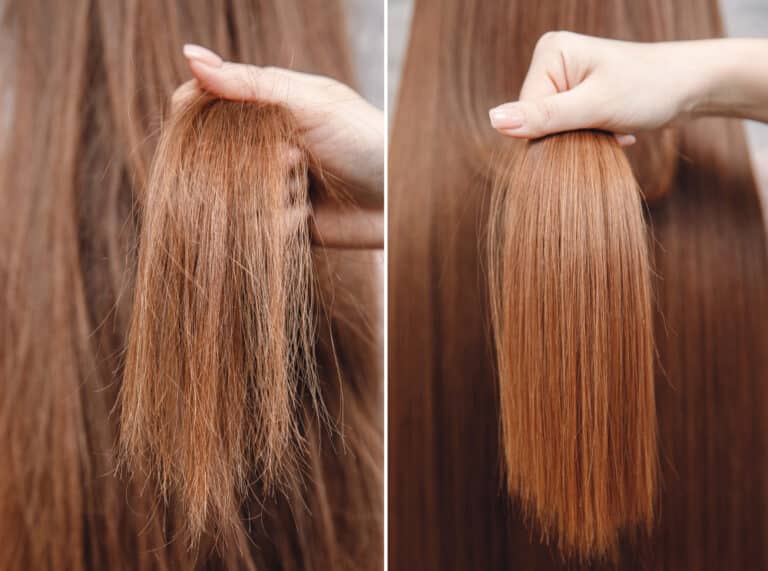
Hormones play a significant role in regulating hair growth, and imbalances can lead to various hair loss problems. How hormones affect hair health, the different types of hormones that impact hair follicles, and the effects of hormone imbalances on hair are all complex topics. We will explore them to help you understand what you can do about them.
Types of Hormones Affecting Hair
It’s essential to understand the three main hormones affecting your hair: androgens, thyroid hormones, and estrogens. Together, these hormones regulate the hair growth and renewal cycle, and imbalances in any of them can disrupt this cycle.
Androgens
Androgens help regulate hair growth by attaching to receptors in the hair follicles. The level of sensitivity of your follicles to these hormones determines your hair growth rate and pattern. If you’ve heard of male or female pattern baldness, you’ve encountered the effects of androgens on hair. An androgen known as dihydrotestosterone, or DHT, is incredibly potent. It shrinks the hair follicles, leading to thinning hair and, eventually, hair loss. While this is most associated with men, all people have androgen hormones in their bodies, meaning anyone can potentially suffer from hair loss.
Thyroid Hormones
The thyroid is a small but mighty gland in the neck that produces hormones responsible for regulating the body’s metabolism, including hair growth. Thyroid hormones regulate the lifecycle of hair follicles, which includes the anagen (growth), catagen (transition), and telogen (resting) phases. Both an underactive thyroid (hypothyroidism) and an overactive thyroid (hyperthyroidism) can lead to hair loss. This is because imbalances in thyroid hormones disrupt the hair growth cycle, generally causing hair to stay in the shedding phase without being replenished as quickly as it should be.
Estrogens
Estrogens contribute to healthy, strong hair growth and can even enhance the growth cycle, leading to thicker, longer hair. Estrogens play a protective role against hair loss. They extend the growth phase of the hair growth cycle, resulting in less shedding. However, an imbalance in estrogen levels, such as during menopause or due to contraceptive use, can overturn this protective effect and lead to increased hair fall. Similar to androgens, everyone naturally possesses estrogens (men included), so anyone can have imbalances in this hormone.
Hormone Imbalances and Hair Loss
Hormonal shifts in the body can easily disrupt hair growth cycles, leading to hair thinning or loss. These fluctuations may be due to various conditions such as pregnancy, menopause, thyroid disorders, or metabolic disorders, among others.
How Hormone Imbalances Disrupt the Hair Growth Cycle
Hormone imbalances can shorten or lengthen the different phases of the hair growth cycle, leading to abnormal hair shedding or decreased hair regeneration. Too much androgen can lead to hair follicles shrinking, thus creating thinner and shorter hair strands. In contrast, insufficient estrogen or thyroid hormones can lead to a shorter growth phase, resulting in hair thinning or even baldness over a prolonged period.
Common Signs of Hormone-Related Hair Loss
Hormone-related hair loss usually occurs evenly across the scalp rather than manifesting in patches like other types of hair loss. Increased hair shedding, thinner hair strands, or a widening part are often the first signs. It’s common to notice hair loss not just on your head but also on other parts of your body, such as your eyebrows or eyelashes.
Addressing Hormone-Related Hair Loss With TM Hair’s Services
At TM Hair in Houston, TX, we understand the distress that hormonal hair loss can cause. That’s why we offer various services to help manage hormonal hair loss.
Consultation and Scalp Analysis
The first step is an in-depth consultation and scalp analysis. We look at your hair and scalp under a microscope to understand the extent of the hair loss and establish its likely cause.
Customized Hair Loss Solutions
We then develop a customized hair loss solution for you, which might include non-surgical treatments like medicated shampoos and lotions, surgical procedures like transplants, or medical interventions such as hormone replacement therapy.
Manage Hair Loss and Hormones With TM Hair
Hormones are crucial in hair health, and imbalances can lead to significant hair loss. Understanding how these hormones work can help you to find a solution. Whether it’s due to androgens, thyroid hormones, or estrogens, TM Hair is here to help you navigate hormonal hair loss.
Take the first step toward healthier hair and a confident you by contacting TM Hair for a personalized consultation and exploring our hormone-balancing treatments tailored to your unique needs.
Parilov/Shutterstock

